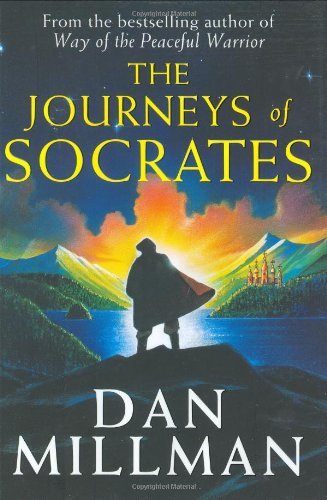
The Journeys of Socrates
Book Description
What if the key to life’s deepest truths lay buried in a journey not just of miles but of the heart? In "The Journeys of Socrates," Dan Millman weaves a mesmerizing tale of an ordinary man thrust into extraordinary circumstances, grappling with inner demons and profound wisdom. As Socrates navigates the trials of friendship and betrayal, each encounter challenges his views and ignites a fiery pursuit for self-discovery. Against a backdrop of vibrant landscapes and ancient philosophies, tension builds, and choices echo through time. Will Socrates uncover the essence of truth before it slips away?
Quick Book Summary
"The Journeys of Socrates" by Dan Millman offers an inspiring narrative blending philosophical exploration with a deeply personal quest. The novel follows Sergei Ivanov, a young man in 19th-century Russia who will later become the wise mentor known as Socrates. Orphaned and confronted with violence and hardship, Sergei is propelled into an epic journey across diverse landscapes, from the city streets to spiritual sanctuaries. Through trials of friendship, betrayal, and moral dilemmas, he is continually challenged to rise above anger, fear, and grief. Each transformative encounter gradually unlocks deeper levels of understanding, as Sergei seeks to discover enduring truths about love, honor, and the true path to wisdom. The story ultimately reveals that the greatest journey is an inner one, where discipline, compassion, and self-realization mark the route toward enlightenment.
Summary of Key Ideas
Table of Contents
The Search for Inner Wisdom
Sergei Ivanov’s life is marked by tragedy from the outset, as he is orphaned and left to face a world marred by violence and uncertainty. Early on, Sergei struggles with feelings of anger, loss, and confusion, as he is forced to navigate a society fraught with danger and betrayal. These hardships are not only external but internal as well, stirring existential questions within him. The challenges he faces drive Sergei to embark on a journey both literal and metaphorical, in an effort to find deeper meaning and solace amid chaos.
Overcoming Adversity and Trauma
Along his travels, Sergei forms significant relationships with mentors and friends who become catalysts for his growth. Some offer guidance and affection, while others present obstacles or even betray him, testing his resolve. Through these encounters, he is challenged to reflect on trust, honor, and the ideals of goodness and justice. Each situation compels Sergei to look beyond surface appearances, urging him to make difficult decisions that shape his character and worldview.
Forgiveness and Letting Go
Central to Sergei’s transformation is his confrontation with his own anger and desire for revenge. The path to wisdom requires him to reckon with personal pain and resist the temptation to perpetuate suffering. Through rigorous spiritual and martial training, he develops discipline and learns to channel his inner turmoil into strength. Forgiveness—toward himself and others—emerges as a necessary passage, allowing Sergei to break free from cycles of resentment and sorrow that have long bound him.
Mentorship and Self-Discovery
The notion of mentorship is profoundly woven throughout Sergei’s journey. Just as he benefits from wise teachers, he eventually grows into the role of mentor himself, becoming the Socrates figure known to readers from Millman’s earlier works. This process of guidance and self-discovery is depicted as reciprocal: in teaching, Sergei finds further enlightenment and purpose. He learns that genuine wisdom is not about wielding power, but about nurturing dignity and kindness in oneself and others.
The Nature of True Strength
Ultimately, the narrative delivers a meditation on the nature of true strength—not as brute force or domination, but as the quiet courage to face life’s suffering with compassion and equanimity. Sergei’s journey illustrates that the search for meaning is intertwined with self-mastery, humility, and love. The story closes with the realization that enlightenment is found not in grand external achievements, but in profound inner peace and the ability to live authentically amidst life’s uncertainties.
Download This Summary
Get a free PDF of this summary instantly — no email required.





